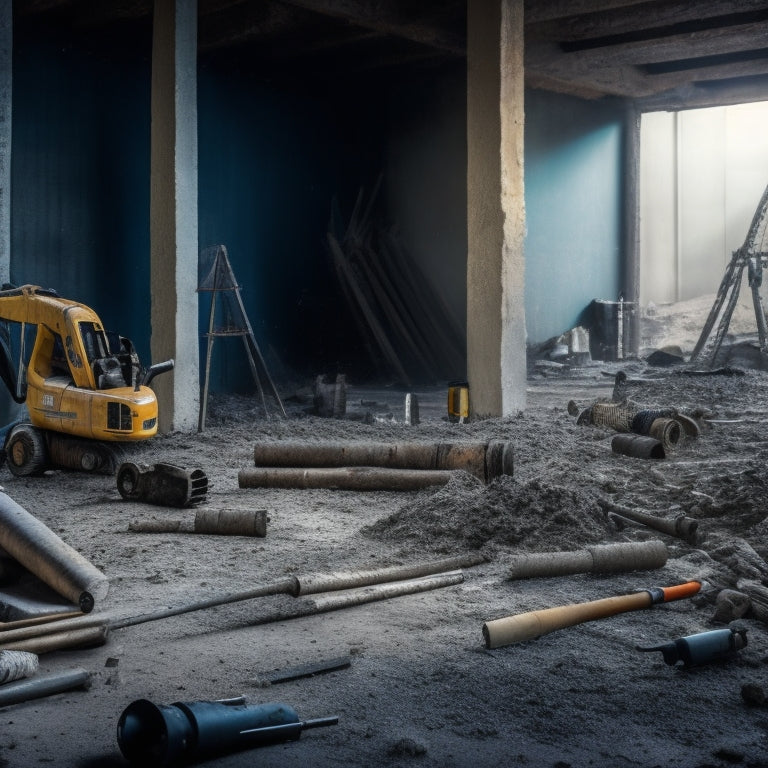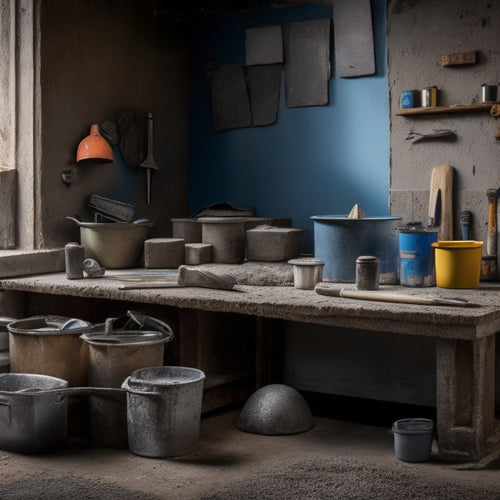
Top Concrete Drilling Tools for Wall Construction
Share
When tackling concrete wall construction, you need high-quality drilling tools to guarantee efficiency, accuracy, and structural integrity. Diamond drill bits, masonry bits, and core bits are essentials for precision and durability. Hammer drills and rotary hammers provide the necessary power for demolishing and drilling through thick concrete walls, while concrete saws are ideal for wall cutting. Additionally, diamond cores offer enhanced performance, accuracy, and durability. By selecting the right tools, you'll reduce drilling times, minimize wear and tear, and ensure successful wall construction projects. Now, explore the details of each tool to optimize your wall construction workflow.
Key Takeaways
• Diamond drill bits are essential for precision and efficiency in cutting hard materials like concrete and asphalt.
• Hammer drills and rotary hammers are necessary for demolishing and drilling through thick or reinforced concrete walls.
• Core bits, such as diamond-coated, tungsten carbide, and steel, are available for various masonry materials and influence drilling efficiency.
• Depth measurement systems, like laser-guided and mechanical depth stops, ensure accurate control and prevent over-drilling.
• Diamond cores drill 50% faster than traditional methods, offering enhanced accuracy, durability, and heat dissipation design for wall construction projects.
Essential Drill Bits for Concrete
When drilling into concrete, you'll need a set of reliable drill bits that can withstand the abrasive nature of this unforgiving material.
Diamond drill bits are an excellent choice for concrete drilling, as they're designed to cut through hard materials with precision and efficiency. These bits feature a diamond-coated tip that's extremely resistant to wear and tear, allowing you to drill through concrete with ease.
To guarantee peak performance, it's essential to maintain your drill bits properly. Regular bit maintenance involves cleaning the bits after each use, storing them in a dry place, and sharpening them periodically.
This will help prevent rust and corrosion, reducing the risk of bit failure and prolonging their lifespan.
Hammer Drills for Wall Demolition
You'll need a powerful hammer drill to efficiently demolish concrete walls, especially when working with thick or reinforced concrete structures. This type of drill is designed to handle the toughest demolition tasks, and its hammering action helps to break up the concrete more easily.
When using a hammer drill for wall demolition, it's crucial to take safety precautions to avoid accidents. Always wear protective gear, including gloves, safety glasses, and a dust mask. Additionally, make certain the drill is properly maintained to prevent overheating or motor failure.
Here are some key considerations for hammer drill maintenance:
-
Regularly clean the drill to prevent dust and debris buildup.
-
Check and replace worn brushes to maintain peak motor performance.
-
Lubricate the drill's moving parts to reduce friction and wear.
- Store the drill in a dry, secure location to prevent damage or theft.
Rotary Hammers for Fast Drilling
Rotary hammers, also known as rotary drills, excel at fast drilling through concrete walls, making them a crucial tool for efficient wall construction. As you work on your wall construction project, you'll need a rotary hammer that can deliver high drilling speed and precision.
There are several rotary hammer types to choose from, including electric, pneumatic, and cordless models. Each type has its own strengths and weaknesses, so it's important to select the one that best fits your specific needs.
When it comes to drilling speed, rotary hammers are unmatched. They can drill through concrete at speeds of up to 1,200 RPM, making them ideal for large-scale projects.
Additionally, many rotary hammers come with adjustable speed controls, allowing you to customize the drilling speed to suit the specific material you're working with.
With the right rotary hammer, you'll be able to complete your wall construction project quickly and efficiently, without sacrificing precision or quality.
Core Drills for Precise Holes
When you're working with core drills, you'll quickly realize that the type of drill bit material you're using can greatly impact the quality of the hole you're creating.
You'll need to take into account the speed and torque control of your drill, as these factors will also influence the precision of your holes.
Drill Bit Materials Matter
Selecting the right drill bit material is essential in achieving precise holes and minimizing damage to the surrounding concrete, as different materials exhibit varying levels of hardness, durability, and thermal resistance. When you're working with concrete, you need a drill bit that can withstand the abrasive nature of the material.
Here are some key factors to evaluate when choosing a drill bit material:
-
Tungsten Carbide (TC): Ideal for drilling through hard, abrasive materials like concrete. TC bits are extremely durable and resistant to wear.
-
Diamond-Coated: These bits feature a diamond-coated cutting edge, which provides excellent thermal resistance and reduces heat buildup. They're perfect for drilling through concrete with high rebar content.
-
Steel: A cost-effective option for drilling through soft concrete or when speed is a priority. Steel bits are more prone to wear, but they're a good choice for smaller projects.
- Ceramic: These bits are designed for high-speed drilling and feature advanced coating technologies to reduce heat buildup. They're ideal for drilling through concrete with low rebar content.
Speed and Torque Control
With the right drill bit material in hand, you can now focus on enhancing your drilling process by mastering speed and torque control, which is vital for achieving precise holes in concrete wall construction.
To achieve ideal results, it's important to understand the relationship between speed and torque. Torque optimization is key to preventing drill bits from overheating and reducing wear and tear on your equipment. You should aim to maintain a consistent torque output, taking into account the drill bit's diameter and the type of concrete you're working with.
Speed adjustments are equally important, as excessive speed can lead to inaccurate hole placement and reduced drill bit lifespan. By making precise speed adjustments, you can guarantee that your drill bit is operating within its best range, resulting in cleaner, more precise holes.
When making speed adjustments, consider the drill bit's material, the concrete's hardness, and the hole's desired diameter. By balancing speed and torque, you'll be able to achieve precise holes with ease, guaranteeing that your concrete wall construction projects meet the highest standards of quality and precision.
Masonry Bits for Accurate Drilling
When you're working with masonry bits, you'll want to take into account the materials that make up the drill bit, as they greatly impact its performance.
You'll find that carbide-tipped bits offer exceptional durability and resistance to wear.
Drill Bit Materials Matter
You need drill bits made from high-quality materials that can withstand the rigors of masonry drilling to achieve accurate results and minimize bit wear. The type of material used in your drill bits considerably impacts their performance. When it comes to masonry drilling, you require bits that can handle the tough conditions and maintain their sharpness.
Here are some key factors to evaluate when selecting drill bits:
-
Tungsten carbide: A popular choice for masonry drilling, tungsten carbide offers exceptional hardness and wear resistance.
-
High-speed steel (HSS): HSS bits are ideal for drilling through soft to medium-hard materials and provide a balance between durability and affordability.
-
Cobalt steel: Cobalt steel bits are designed for high-temperature applications and offer superior heat resistance.
- Diamond-coated: Diamond-coated bits are perfect for drilling through extremely hard materials, such as concrete and asphalt.
Carbide-Tipped for Durability
When it comes to masonry drilling, you need drill bits that can withstand the toughest materials. Two carbide-tipped drill bits stand out for their exceptional durability and accuracy in masonry drilling: the spiral flute and the step drill bit.
These bits take advantage of carbide's unique properties, which provide superior wear resistance and heat tolerance. The carbide advantages make them ideal for drilling through concrete, brick, and block. Here's a breakdown of their carbide applications:
| Drill Bit Type | Carbide Application |
|---|---|
| Spiral Flute | Ideal for drilling large holes in concrete and masonry |
| Step Drill Bit | Perfect for drilling precise, stepped holes in brick and block |
| Both | Excellent for drilling through rebar and other reinforcement materials |
Core Bits for Depth
For accurate drilling and maximum depth penetration in masonry construction, core bits are designed to excel in demanding applications. You'll find that these bits are crafted with specific features to tackle tough materials and deliver precise results.
When working with core bits, you'll encounter various types, each suited for specific tasks. Consider the following key aspects to optimize your drilling experience:
-
Core bit types: Diamond-coated, tungsten carbide, and steel bits cater to different masonry materials and drilling requirements.
-
Depth measurement: Guarantee accurate depth control with laser-guided or mechanical depth stop systems.
-
Bit geometry: Optimize drilling efficiency with bits featuring advanced geometries, such as stepped or tapered designs.
- Cooling systems: Efficient cooling mechanisms, like dust extraction or water cooling, prevent overheating and extend bit lifespan.
Concrete Saws for Wall Cutting
Concrete saws, specifically designed for wall cutting, efficiently slice through concrete, asphalt, and masonry materials with precision and control. When you're working on a wall construction project, you need a saw that can handle varying wall thicknesses and cutting depths.
Look for a saw that allows you to adjust the cutting depth to suit your needs. For instance, if you're working on a wall with a thickness of 12 inches, you'll want a saw that can cut up to 12 inches deep. Additionally, consider the type of blade you need. A diamond-coated blade is ideal for cutting through concrete and masonry, while an abrasive blade is better suited for asphalt.
When operating a concrete saw, it's crucial to maintain control and precision. You'll want to verify the saw is properly aligned with the cutting path and that you're applying consistent pressure. This will help you achieve a clean, straight cut.
Remember to also follow safety guidelines, such as wearing protective gear and keeping the work area clear of debris. With the right concrete saw and proper technique, you'll be able to make precise cuts in concrete, asphalt, and masonry materials with ease.
Diamond Cores for Efficient Drilling
You'll need to switch to diamond cores for efficient drilling, as they offer superior performance and accuracy when creating holes in concrete, asphalt, and masonry materials for wall construction projects.
Diamond cores are designed to withstand the rigors of drilling through hard materials, providing a faster and more precise way to create holes for anchors, pipes, or other wall construction requirements.
Here are some key benefits of using diamond cores:
-
Faster drilling times: Diamond cores can drill through materials up to 50% faster than traditional drilling methods.
-
Improved accuracy: Diamond cores provide a more precise hole, reducing the risk of deviation or damage to surrounding materials.
-
Increased durability: Diamond cores are designed to withstand the rigors of drilling, reducing the need for frequent bit replacements.
- Reduced heat buildup: Diamond cores are designed to dissipate heat, reducing the risk of overheating and increasing the lifespan of the drill bit.
Frequently Asked Questions
Can I Use a Regular Drill for Drilling Into Concrete Walls?
You're wondering if your regular drill can handle drilling into concrete walls. While it's possible, it's not the most effective or safe approach.
Concrete hardness varies, and using a standard drill can lead to bit breakage, motor burnout, or even damage to the wall.
You'll need a drill specifically designed for concrete, such as a hammer drill or rotary hammer, which can handle the high torque and impact required to penetrate concrete effectively.
How Do I Prevent Overheating During Prolonged Drilling Sessions?
As you drill into concrete, the sparks fly like fireworks on a summer night, but beware, prolonged sessions can be a recipe for disaster.
You'll need to prevent overheating, or risk damaging your tool and compromising the structure. To avoid this, refine your drilling techniques by using slower speeds and applying moderate pressure.
Additionally, incorporate cooling methods like spraying water or using a drill with a built-in cooling system to keep your tool running smoothly and prevent overheating.
What Safety Gear Is Essential for Concrete Drilling and Demolition?
When you're concrete drilling and demolishing, you're exposed to hazardous debris and airborne particles.
You need to prioritize your safety. You must wear safety goggles to protect your eyes from high-velocity fragments and dust masks to prevent inhaling harmful particles.
These essential gear will safeguard you from serious injuries and long-term health risks.
Don't compromise on your well-being – always wear them to guarantee a safe and efficient drilling process.
Can I Drill Into Concrete Walls When They Are Still Curing?
'Don't count your chickens before they hatch' - it's crucial to wait for concrete to fully cure before drilling.
If you don't, you risk damaging the wall or compromising its structural integrity.
The curing effects of concrete are critical, and drilling too soon can lead to cracks or weak spots.
Timing is everything; wait until the recommended curing period has passed, usually 28 days, before attempting to drill into the concrete wall.
How Do I Properly Clean and Maintain Concrete Drilling Tools?
When you're done drilling, you'll want to properly clean and maintain your concrete drilling tools to extend their lifespan and guarantee peak performance.
Start by removing debris and dust from the tool using a soft-bristled brush or cloth. Then, apply a rust-inhibiting coating to metal components.
Store your tools in a dry, organized space, utilizing tool storage systems to prevent damage.
Regularly employ maintenance techniques like sharpening and lubricating to keep your tools in top condition.
Conclusion
You've got the blueprint for wall construction, and now it's time to build.
With the right concrete drilling tools, you're the conductor of an orchestra, expertly directing each drill bit, hammer, and saw to create a symphony of precision and efficiency.
From essential drill bits to diamond cores, you're equipped to tackle any wall construction project with confidence.
With these top concrete drilling tools, the walls will come tumbling down – or rather, come rising up – with ease.
Related Posts
-

Essential Tools for Concrete Wall Covering Projects
When tackling a concrete wall covering project, you'll need a range of essential tools and equipment. For cleaning an...
-

Essential Tools for Epoxy Concrete Floor Repair
You'll need a thorough arsenal of specialized tools to guarantee a successful epoxy concrete floor repair. Floor prep...
-

Top Tools for Beginners in Concrete Masonry Coating
You're about to begin a concrete masonry coating project, and having the right tools is essential. Start with essenti...


